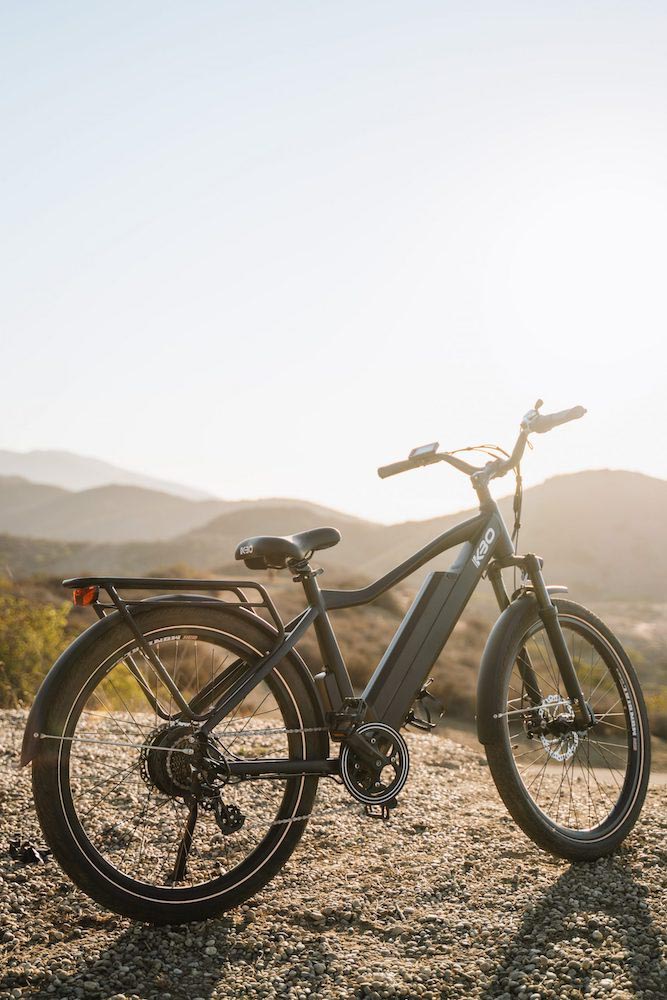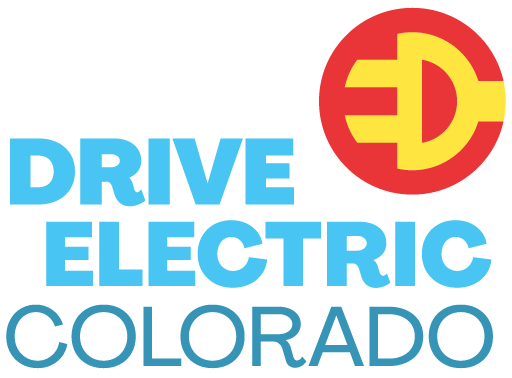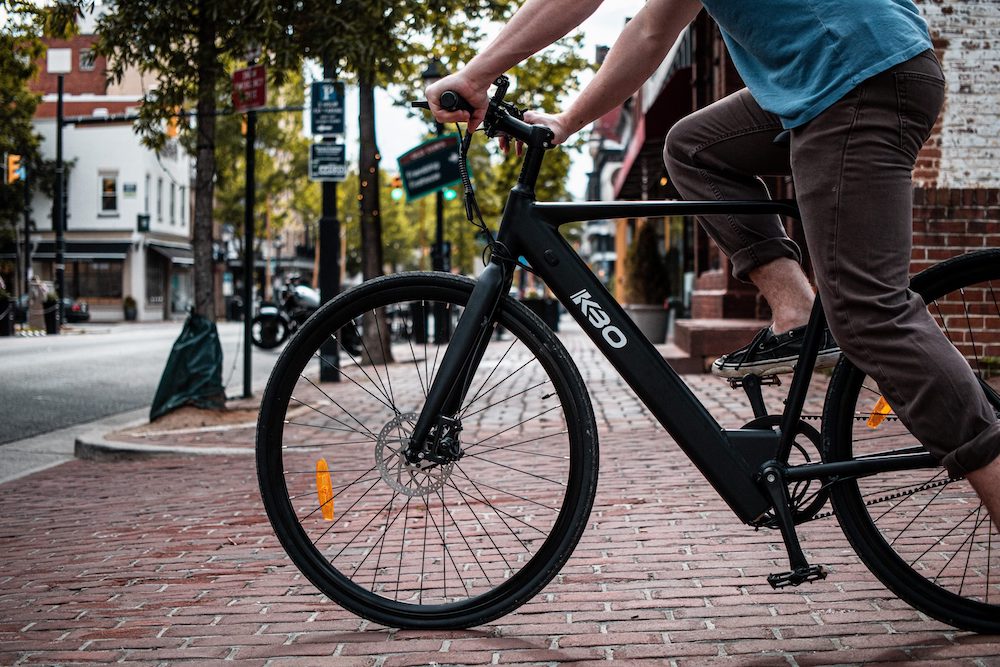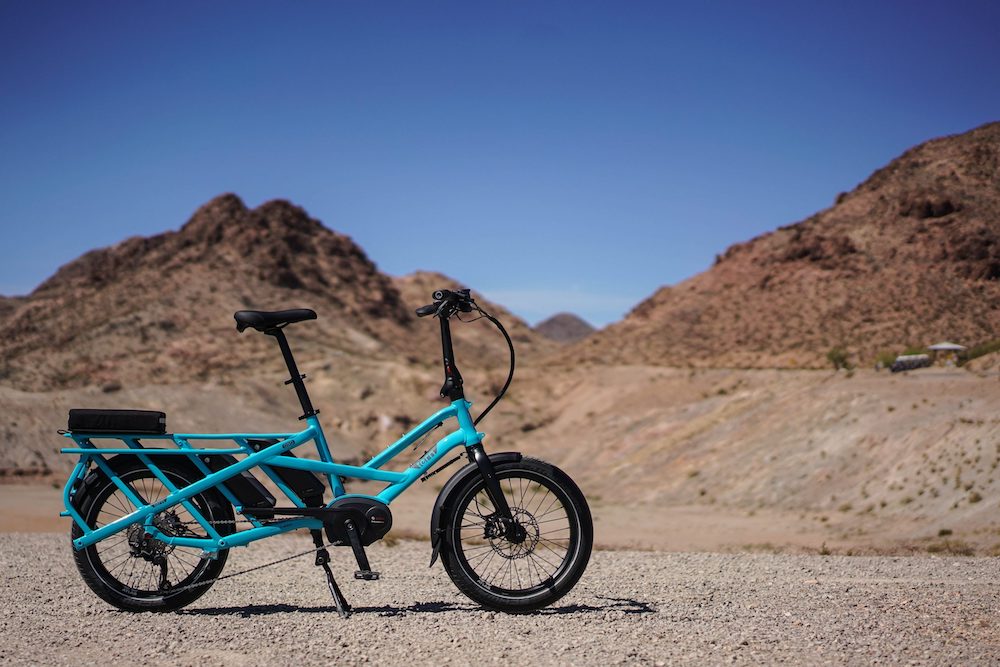Electric bicycles (e‑bikes) are growing in popularity as an alternative mode of transportation. E‑bikes are great for one’s health, help reduce air and noise pollution, and they're fun to ride! Even though they appear new, e‑bikes have been around since the late 1890s!¹ The modern e‑bike came to the scene in the 1990s. Since then, people have been switching to e‑bikes as a more accessible way to exercise than a regular pedal-powered bike and as a replacement for car trips!²
What is an E‑Bike?

- Electric bicycles (e‑bikes) are either road, mountain, or cargo bikes with a battery-powered motor that assists with the pedaling power. E‑bikes give you the ability to cover multiple miles with minimal effort and can reach speeds up to 28 miles per hour. *Disclaimer: Be sure to check your municipality for speed restrictions as these vary by area* E‑bikes can help riders of different abilities and ages cover longer distances and hills that they otherwise would not be able to.
- There are three classifications of e‑bikes:
- Class 1: A bike equipped with a motor that assists the rider only when pedaling. This type of e‑bike reaches a top speed of 20 mph with the pedal assist.
- Class 2: A bike equipped with a motor activated with a throttle that provides a boost. This type of e‑bike reaches a top speed of 20 mph with the throttle
- Class 3: A bike equipped with a motor that assists the rider only when pedaling, up to a top speed of 28 mph
NEW Statewide E‑Bike Rebates
Colorado residents are now able to accept rebates on E‑Bikes dependent on their income.
Qualifying Colorado residents earning between 80 to 100 percent of their county area's median income will be able to accept a rebate of $500 on qualifying E‑Bikes.
Qualifying Colorado residents earning less than 80 percent of their county area's median income will be able to accept a rebate of $1,100 on qualifying E‑Bikes.
Participant Eligibility:
- Must be a Resident of the State of Colorado
- Must be at least 18 years of age or older
- Must be able to provide proof of Colorado address
- Must be able to provide proof of income
E‑Bike Eligibility:
- Can be any class 1, 2, or 3 E‑Bike in accordance with the State of Colorado's E‑Bike definition
- Must have an electric motor not exceeding 750 watts
- Full suspension mountain bikes do not qualify
For more information visit: The Colorado Energy Office
Denver E‑Bike Rebates
New e‑bike rebates are to be released every first Monday of the month for the city of Denver.
For the standard e‑bike rebate, a city of Denver resident is eligible for a $300 rebate and a $1200 rebate for income-qualified applicants. Currently, 40% of the e‑bike applications are reserved for income-qualified applicants.
Additionally, for e‑cargo bikes, Denver residents are eligible for a $500 rebate or a $1200 rebate for income-qualified applicants.
Mountain e‑bikes are not currently eligible.
If your application for a rebate is approved, you will receive a voucher to use at any participating bike shop in and around the city of Denver. There are currently 25 participating shops.
You need to have an address in the City of Denver to qualify.
To stay up to date on rebate opportunities subscribe to the City of Denver's newsletter, and you can find more information on e‑bike rebates here.
Stay tuned to learn more about a state e‑bike program, expected to come out in 2023.
|
Programa de bicicletas eléctricas de Denver Para el reembolso estándar de bicicletas eléctricas, un residente de la ciudad de Denver es elegible para un reembolso de $300 o un reembolso de $1200 para solicitantes con ingresos calificados. Actualmente, el 40% de las solicitudes de bicicletas eléctricas están reservadas para solicitantes con ingresos calificados. Además, para las bicicletas eléctricas de carga, los residentes de Denver son elegibles para un reembolso de $500 o un reembolso de $1200 para solicitantes con ingresos calificados. ¡Obtenga más información en nuestro sitio web! |
Price, Range, and Battery
- Entry level e‑bikes cost about $1,500 and high end e‑bikes can cost $8,000+
- E‑bike range depends on a variety of factors including: speed of the bike, rider weight, terrain style, wind conditions, tire choice
- Range also varies depending on the brand and model of an e‑bike, the power outage and battery type, and capacity.
- Bosch has an E‑Bike Range Calculator³ that can help you estimate the range of your e‑bike based on a variety of factors.
- On average, an electric bike can go 25–50 miles on a single charge.⁴
- E‑bike batteries can be charged from a standard wall outlet, and many models allow you to remove the battery for charging or replace it with a longer range battery.
- Most modern e‑bikes use lithium-ion batteries, which are the same batteries that power most electric vehicles.
- The capacity of an e‑bike battery is measured in amp hours (Ah) or watt hours (Wh)
Which type of E‑Bike is right for me?
Road E‑Bike
- Perfect for the person who wants a sweat-free commute to work, does bike-accessible errands around town, or enjoys city riding.
- In Colorado, e‑bikes are regulated just like bicycles; the same rules of the road apply to both e‑bikes and human-powered bikes.
- Colorado recognizes the Class 1, 2, 3 classifications of e‑bikes.
- Riders of Class 3 e‑bikes under 21 years of age must wear a helmet. Persons under 16 years of age may not ride a Class 3 e‑bike.
- Local governments have the authority to restrict the use of e‑bikes under motor power on bike paths. When in doubt, check with your town, city, or county for local rules and regulations.
Mountain E‑Bike
- The ideal bike for an off-road lover or someone who loves riding where the road bike doesn’t go.
- Electric mount bikes (E‑MTBs) have a mid-drive motor and battery attached to the frame for better weight distribution.
- E‑MTBs are not allowed on all human-powered bike trails. Check with your local land management agency before riding your E‑MTB on a designated trail.
- Federal: On federal lands, electric mountain bikes are considered motorized vehicles and have access to motorized trails. Contact the US Forest Service Rocky Mountain Regional Office or the Bureau of Land Management Colorado State Office for more information.
- E‑MTBs typically come with front or full suspension.
- E‑MTBs are one of the more costly e‑bike types, ranging from $1,200 to $12,000 or higher.
Cargo E‑Bike
- Cargo e‑bikes are optimal for replacing car trips and can carry all types of cargo, including kids!
- Two basic types: Longtail and Frontbox
- Frontbox: cargo box between the rider and front wheel
- Longtail: Extended rear end of the bike to carry people or cargo.
- Prices range from $1,000 to $5,000 or higher
E‑Bike Share Programs
Want to try an e‑bike for yourself? Check out these Colorado programs!
We Cycle – Roaring Fork Valley
eBikes for Essential Workers in Vail – Vail
Vail eBike Share General Public – Vail
Holy Cross Energy rebate for eBike purchase – Roaring Fork and Eagle Valley
Pike Ride – Colorado Springs
e‑Cycle to Own Program – Pueblo
Boulder B‑Cycle – City of Boulder
Lyft and Lime – City of Denver
Spin – Fort Collins
Zagster Bikeshare – Meridian Metro District
E‑Bike Motors
Torque is important if you plan on riding lots of hills or hauling heavy loads. The more torque your bike has, the better it will perform. Both types of motors have their own advantages and disadvantages. Talk to your local e‑bike retailer to determine which type of e‑bike is right for you.
Hub Motor
- A hub motor sits on either the front or rear wheel. Hub motors are often less expensive and more versatile than central drive motors.
Mid Drive Motor
- A mid drive motor is incorporated on or next to the bottom bracket of the bicycle. Mid-drive motors tend to be smaller and lighter, with more torque than hub motors.
E‑Bike Charging
Charging an e‑bike is easy! It uses the same outlet you'd use to charge your phone (just like an EV).
Always charge your e‑bike battery with the supplied charger plugged straight into the wall (avoid using extension cords).
Do not charge unattended or overnight. Never leave it plugged in when it is not charging.
A lack of power and fluctuation in voltages are both signs to change your electric bicycle’s battery.
Needing to recharge your battery frequently indicates decay and should be replaced.
Information from peopleforbikes.org.



